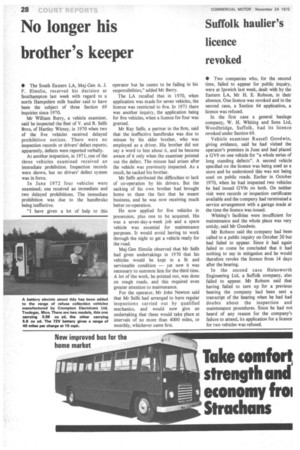No longer his brother's keeper
Page 30

If you've noticed an error in this article please click here to report it so we can fix it.
• The South Eastern LA, Maj-Gen A. J. F. Elmslie, reserved his decision at Southampton last week with regard to a north Hampshire milk haulier said to have been the subject of three Section 69 inquiries since 1970.
Mr William Berry, a vehicle examiner, said he inspected the fleet of V. and R. Selfe Bros, of Hartley Witney, in 1970 when two of the five vehicles received delayed prohibition notices. There were no inspection records or drivers' defect reports; apparently, defects were reported verbally.
At another inspection, in 1971, one of the three vehicles examined received an immediate prohibition. Inspection records were shown, but no drivers' defect system was in force.
In June 1972 four vehicles were examined; one received an immediate and two delayed prohibitions. The immediate prohibition was due to the handbrake being ineffective.
"I have given a lot of help to this operator but he seems to be failing in his responsibilities," added Mr Berry.
The LA recalled that in 1970, when application was made for seven vehicles, the licence was restricted to five. In 1971 there was another inquiry, the application being for five vehicles, when a licence for four was granted.
Mr Ray Selfe, a partner in the firm, said that the ineffective handbrake was due to misuse by his elder brother, who was employed as a driver. His brother did not say a word to him about it, and he became aware of it only when the examiner pointed Out the defect. The misuse had arisen after the vehicle was previously inspected. As a result, he sacked his brother.
Mr Selfe attributed the difficulties to lack of co-operation by his drivers. But the sacking of his own brother had brought home to them the fact that he meant business, and he was now receiving much better co-operation.
He now applied for five vehicles in possession, plus one to be acquired. His was a seven-day-a-week job and a spare vehicle was essential for maintenance purposes. It would avoid having to work through the night to get a vehicle ready for the road.
Maj-Gen Elmslie observed that Mr Selfe had given undertakings in 1970 that his vehicles would be kept in a fit and serviceable condition — yet now it was necessary to summon him for the third time. A lot of the work, he pointed out, was done on rough roads, and this required even greater attention to maintenance.
For the operator, Mr John Newton said that Mr Selfe had arranged to have regular inspections carried out by qualified mechanics, and would now give an undertaking that these would take place at intervals of no more than 4000 miles, or monthly, whichever came first.












































































































